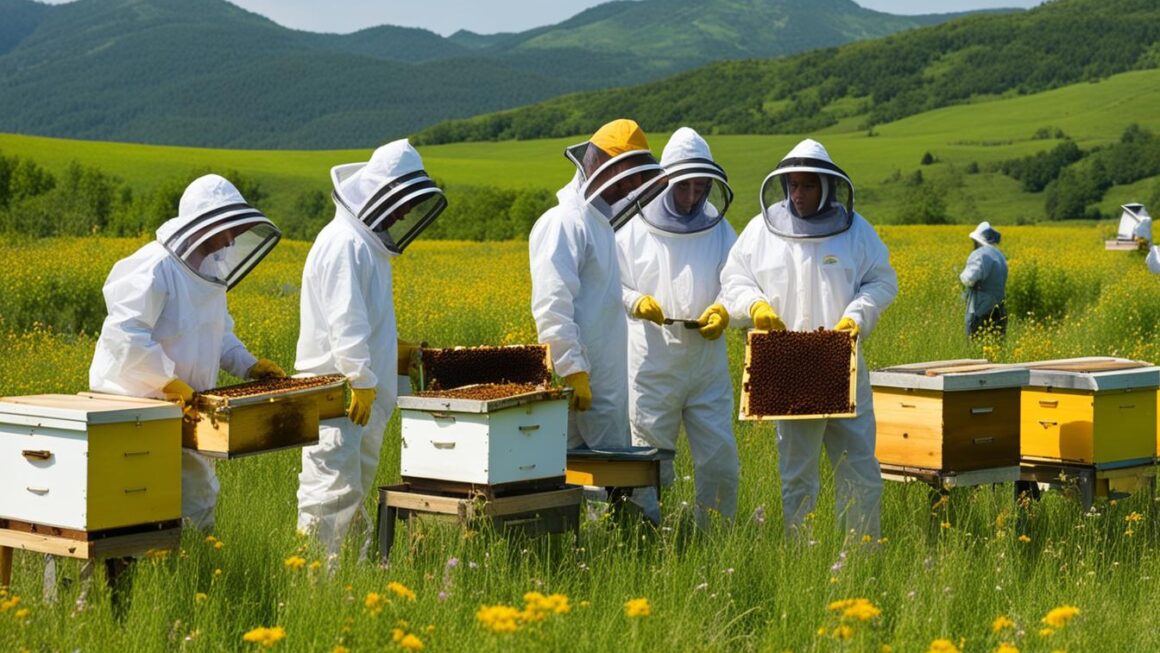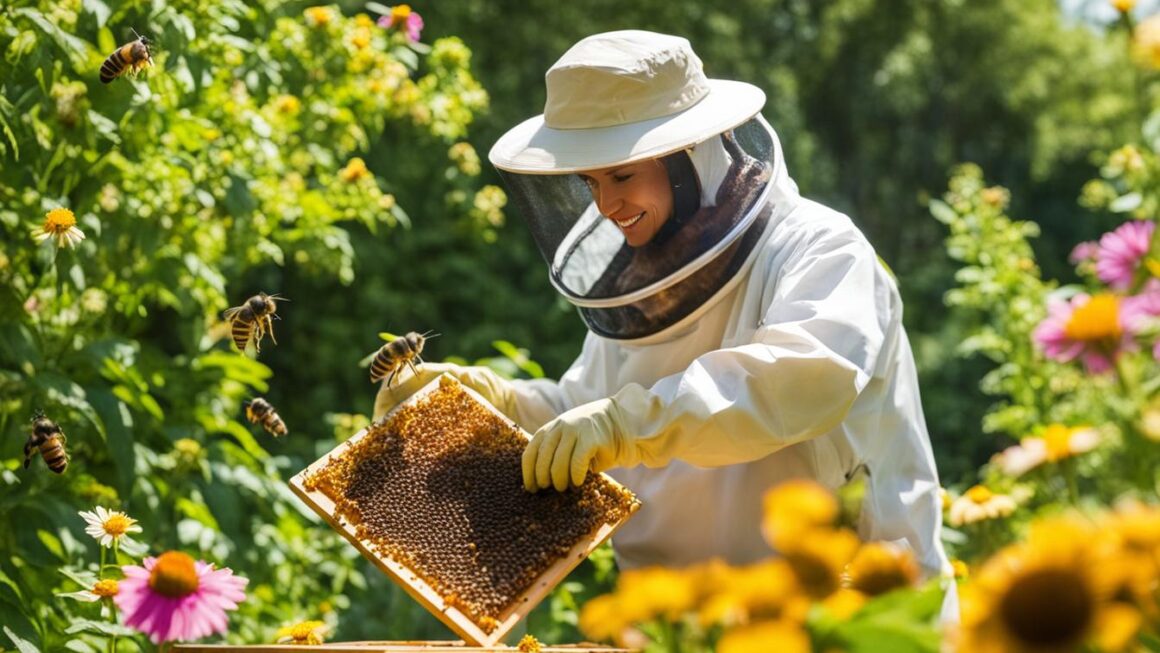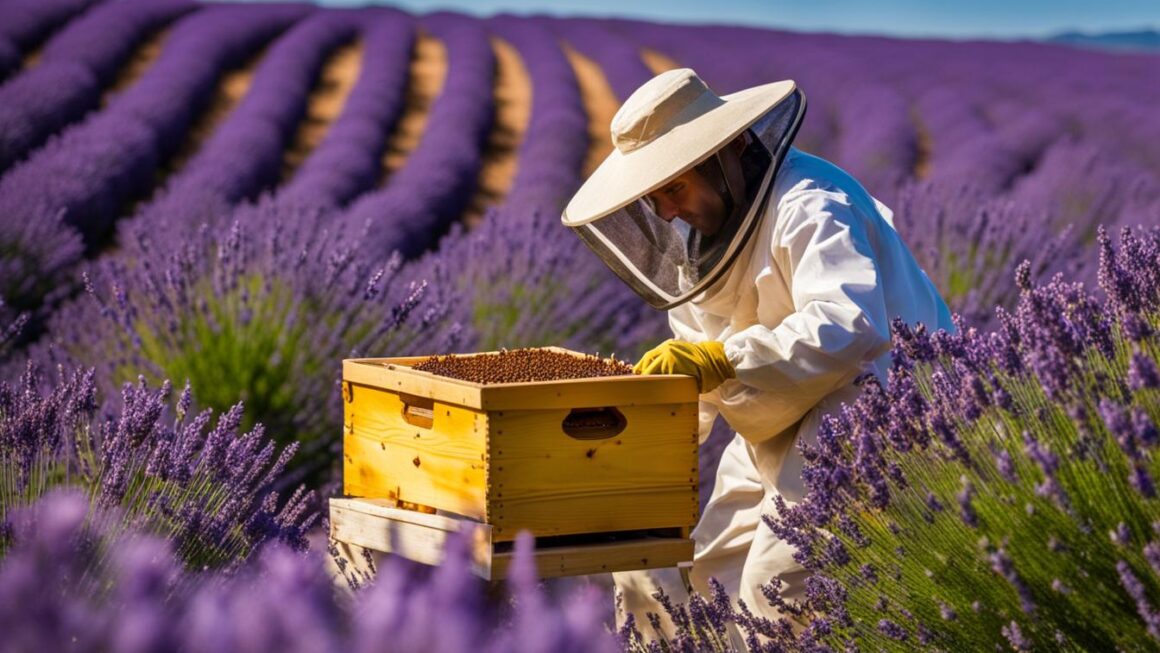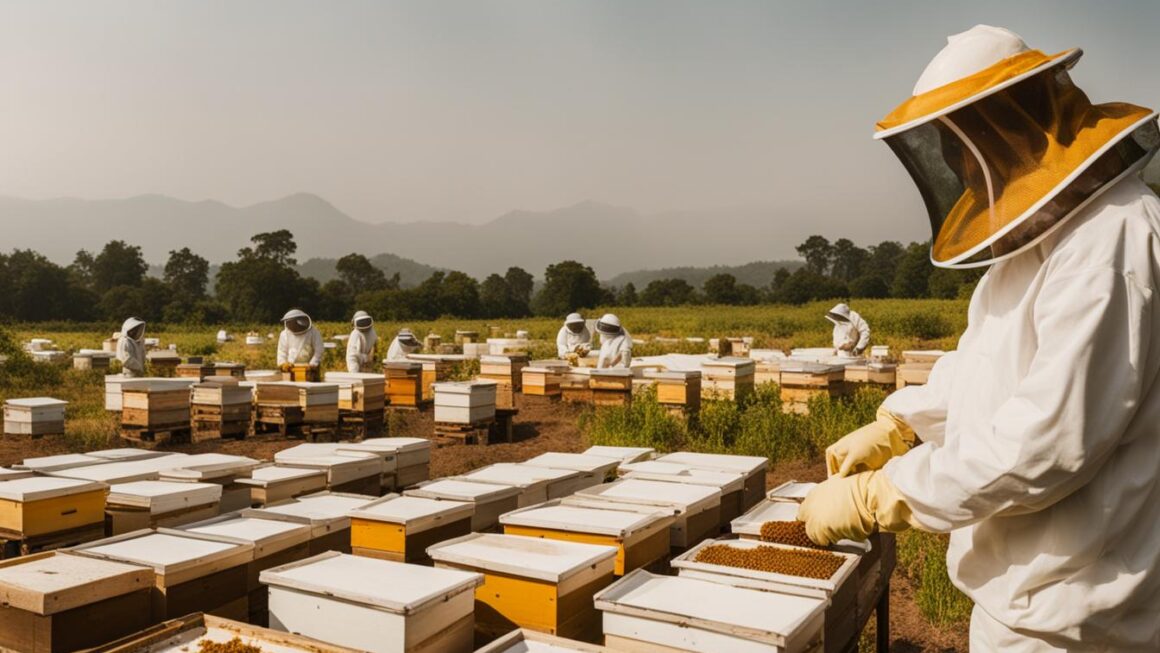Are you passionate about making a difference in the world and interested in learning about the fascinating world of bees? Joining beekeeping volunteer opportunities can be a great way to contribute to preserving our environment and bee populations while gaining hands-on experience and knowledge. There are various ways you can get involved in the beekeeping community without having your own beehive.
Key Takeaways:
- By volunteering in beekeeping, you can make a positive impact on the environment while learning about bees.
- You don’t need to have your own beehive to get involved in the beekeeping community.
- Beekeeping websites and blogs provide valuable information and insights from experienced beekeepers.
- Connecting with local beekeeping mentors can provide invaluable knowledge and experience.
- Joining beekeeping associations and clubs allows you to access resources and network with beekeepers.
Beekeeping Websites and Blogs
When it comes to learning about beekeeping and making a difference in the world, beekeeping websites and blogs are invaluable resources. They provide a wealth of information, advice, and firsthand experiences from experienced beekeepers, making it easier for beginners to get started on their beekeeping journey. These online platforms offer a range of content, including articles, tutorials, and even forums to connect with like-minded individuals.
Some popular beekeeping blogs worth exploring include PerfectBee and Adventures in Beeland. PerfectBee covers a wide range of topics, from beekeeping basics to advanced techniques, while Adventures in Beeland offers insightful stories and personal experiences. These blogs not only provide valuable information but also foster a sense of community and support among beekeepers.
Whether you want to learn about hive management, honey extraction, or the latest beekeeping trends, beekeeping websites and blogs are excellent platforms to expand your knowledge and connect with others who share your passion for bees.
Local Beekeeping Mentors
If you’re eager to dive into the world of beekeeping but don’t have your own beehive yet, connecting with a local beekeeping mentor can provide valuable guidance and hands-on learning opportunities. These experienced beekeepers are often willing to share their knowledge and expertise, helping you gain insights into beekeeping practices specific to your region.
By assisting a local beekeeping mentor in their own beekeeping operation, you can learn firsthand about hive management, seasonal practices, and potential challenges that beekeepers in your area may face. This practical experience can complement any theoretical knowledge you gather from books, websites, or blogs. Plus, it allows you to establish connections within the beekeeping community, opening doors to future collaborations and networking opportunities.
When seeking a local beekeeping mentor, start by searching online for beekeeping associations or clubs in your area. These organizations often have mentorship programs in place or can connect you with experienced beekeepers who are willing to mentor newcomers. Attending local beekeeping meetings or events can also provide opportunities to meet potential mentors and learn from their experiences.
Table: Benefits of Local Beekeeping Mentors
| Benefits | Description |
|---|---|
| Hands-on experience | Assist mentors in their beekeeping operations, gaining practical knowledge about hive management and beekeeping techniques. |
| Regional insights | Learn about beekeeping practices specific to your area, including local flora, climate considerations, and pest management. |
| Networking opportunities | Connect with experienced beekeepers and fellow enthusiasts, expanding your professional network in the beekeeping community. |
| Collaborative projects | Establish partnerships and collaborations with mentors, creating opportunities for shared research or joint beekeeping initiatives. |
A local beekeeping mentor can be a valuable resource on your beekeeping journey, providing guidance, support, and opportunities for growth. Embrace the chance to learn from experienced beekeepers in your area and take your passion for bees to new heights.
Beekeeping Associations and Clubs
Joining beekeeping associations and clubs is a fantastic way to connect with fellow bee enthusiasts, gain access to valuable resources, and expand your knowledge about beekeeping practices. These organizations provide a supportive community where beekeepers of all levels can come together to share their experiences and learn from one another. By becoming a member, you’ll have the opportunity to attend meetings, workshops, and events that will further enhance your understanding of bees and their importance in our ecosystem.
One of the benefits of joining a beekeeping association or club is the access to resources and equipment. Many associations have lending libraries where members can borrow books, magazines, and DVDs on various topics related to beekeeping. Additionally, some associations offer discounted rates on beekeeping supplies such as hives, bee suits, and tools. By taking advantage of these resources, you can save money and ensure that you have the necessary equipment to start your own beekeeping journey.
Participating in beekeeping associations and clubs also provides the opportunity to network with experienced beekeepers in your area. These connections can be invaluable as you navigate the challenges and complexities of beekeeping. You can exchange tips, seek advice, and even find mentors who can guide you on your beekeeping journey. Building relationships within the beekeeping community can open doors to new opportunities and help you grow as a beekeeper.
Beekeeping Associations and Clubs in the United States
| Name | Location | Contact |
|---|---|---|
| Beekeepers Association of Central Arizona | Arizona | www.centralazbeekeepers.org |
| California State Beekeepers Association | California | www.californiastatebeekeepers.com |
| Florida State Beekeepers Association | Florida | www.floridabeekeepers.org |
| Ohio State Beekeepers Association | Ohio | www.ohiostatebeekeepers.org |
| Texas Beekeepers Association | Texas | www.texasbeekeepers.org |
These are just a few examples of beekeeping associations and clubs in the United States. There are numerous organizations dedicated to promoting beekeeping and supporting beekeepers in every state. To find a beekeeping association or club near you, you can search online or reach out to your local agricultural extension office. They will be able to provide you with information about the associations and clubs in your area.
By joining a beekeeping association or club, you not only enhance your beekeeping skills but also contribute to the well-being of bees and the preservation of their populations. Being part of a community of like-minded individuals who share your passion for bees can be a rewarding experience that enables you to make a difference in the world of beekeeping.
Making a Difference: Educating Others and Supporting Bee Conservation
If you’re passionate about bees and their conservation, there are various ways you can educate others and contribute to their well-being. By spreading awareness about the importance of bees and supporting bee conservation efforts, you can make a significant difference in preserving these vital pollinators. Here are some ideas to inspire and empower you:
Host Screenings of “Vanishing of the Bees” Documentary
One impactful way to educate others about bees is by hosting local screenings of the documentary “Vanishing of the Bees.” This eye-opening film dives deep into the challenges bees face, including Colony Collapse Disorder, pesticide use, and habitat loss. By organizing community viewings and facilitating discussions afterward, you can raise awareness and stimulate conversations about bee conservation.
Donate to The Honeybee Conservancy
Supporting organizations that actively work towards bee conservation is another valuable way to make a difference. Consider donating to The Honeybee Conservancy, an organization that uses sponsored beehives as educational tools in community gardens. By contributing financially, you directly support their efforts to educate and inspire the next generation of bee enthusiasts.
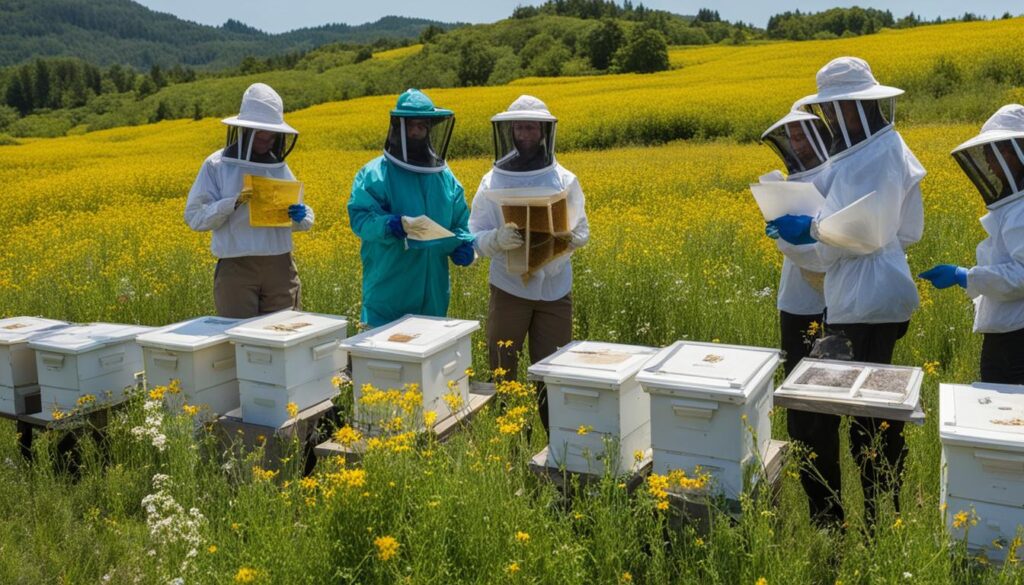
| Ways to Educate Others and Support Bee Conservation | Benefits |
|---|---|
| Host screenings of “Vanishing of the Bees” documentary | Raise awareness and stimulate conversations about bee conservation |
| Donate to The Honeybee Conservancy | Support educational initiatives and inspire future bee enthusiasts |
| Share information about Colony Collapse Disorder and the importance of organic honey | Spread awareness about the challenges bees face and the benefits of sustainable beekeeping practices |
| Engage in online advocacy and use social media platforms to share bee-related content | Reach a wider audience and inspire others to take action for bee conservation |
Share Information and Engage in Online Advocacy
An effective way to educate others about bees and their conservation is by sharing information about Colony Collapse Disorder and the importance of organic honey. You can utilize social media platforms to raise awareness, engage with a wider audience, and inspire others to take action. By advocating for sustainable beekeeping practices and spreading knowledge about the challenges bees face, you contribute to the overall effort of bee conservation.
By incorporating these suggestions into your journey as a bee enthusiast, you can educate others, raise awareness, and support bee conservation effectively. Each small step you take to spread knowledge and inspire action contributes to a brighter future for bees and our planet.
Creating Bee-Friendly Gardens
You can make a significant impact on bee populations and the environment by creating a bee-friendly garden right in your own backyard. No matter the size of your space, there are several steps you can take to ensure your garden is a haven for bees.
Planting a Variety of Nectar-Rich Flowers
One of the most important things you can do is to plant a diverse selection of nectar-rich flowers that bloom at different times of the year. This ensures a constant source of food for bees throughout the seasons. Some bee-friendly flowers to consider include lavender, sunflowers, asters, and coneflowers. Be sure to choose organic and pesticide-free plants to protect bees from harmful chemicals.
Building a Bee Bath
In addition to providing a food source, you can also create a water source for bees by building a bee bath. This can be as simple as a shallow pool of fresh water with landing spots, such as rocks or twigs, for bees to rest and hydrate. Bees need fresh water to drink and cool down, especially during hot summer days.
| Flowers | Season |
|---|---|
| Lavender | Spring, Summer |
| Sunflowers | Summer, Fall |
| Asters | Fall |
| Coneflowers | Summer, Fall |
“Creating a bee-friendly garden is not only beneficial for bees but also adds beauty and diversity to your outdoor space. By providing a variety of nectar-rich flowers and a water source, you are creating a safe and welcoming environment for these important pollinators.” – Beekeeping expert
Keeping Pesticide and Herbicide Use to a Minimum
To ensure your garden remains bee-friendly, it’s crucial to minimize the use of pesticides and herbicides. These chemicals can be toxic to bees and other beneficial insects. Instead, opt for natural pest control methods like companion planting and attracting beneficial insects like ladybugs and lacewings.
By creating a bee-friendly garden, you not only provide essential resources for bees, but you also contribute to the overall health of the ecosystem. Plus, you’ll enjoy the beauty and vibrancy of your garden as it becomes a buzzing hub of activity.
Exploring Bee Farms and Bee Tours
One of the most exciting ways to engage with the world of bees and make a difference is by exploring bee farms and participating in bee tours. These experiences offer a unique opportunity to witness the inner workings of a beekeeping operation, learn about beekeeping practices, and gain a deeper understanding of the importance of bees in our ecosystem.
During a bee tour, you can observe beekeepers in action, see how hives are managed, and even have the chance to handle bees under the guidance of experienced professionals. These hands-on experiences provide invaluable insights and dispel common misconceptions about bees.
“Participating in a bee tour opened my eyes to the incredible complexity of a bee’s life. It’s remarkable to see how these tiny creatures work together to build hives, collect pollen, and produce honey. I now have a newfound appreciation for bees and the role they play in our environment.” – Jessica, Bee Tour Participant
Additionally, bee farms often offer honey tastings, where you can sample different varieties of honey while learning about the unique flavors and characteristics of each. This sensory experience allows you to develop a deeper appreciation for the intricate process of honey production and the diverse range of flavors that bees can create.
Table: Bee Farm Tours Comparison
| Bee Farm | Location | Tour Duration | Highlights |
|---|---|---|---|
| Busy Bee Farm | California | 2 hours | Hands-on hive inspection, honey tasting |
| Sweet Nectar Apiary | Texas | 3 hours | Beekeeping demonstration, nature trail walk |
| Buzzing Meadows | Ohio | 4 hours | Beeswax candle-making workshop, observation hive |
By exploring bee farms and participating in bee tours, you not only gain a deeper appreciation for bees and their vital role in our ecosystem but also support the efforts of local beekeepers and organizations dedicated to bee conservation. So, why not embark on an unforgettable journey into the world of bees and discover how you can make a difference?
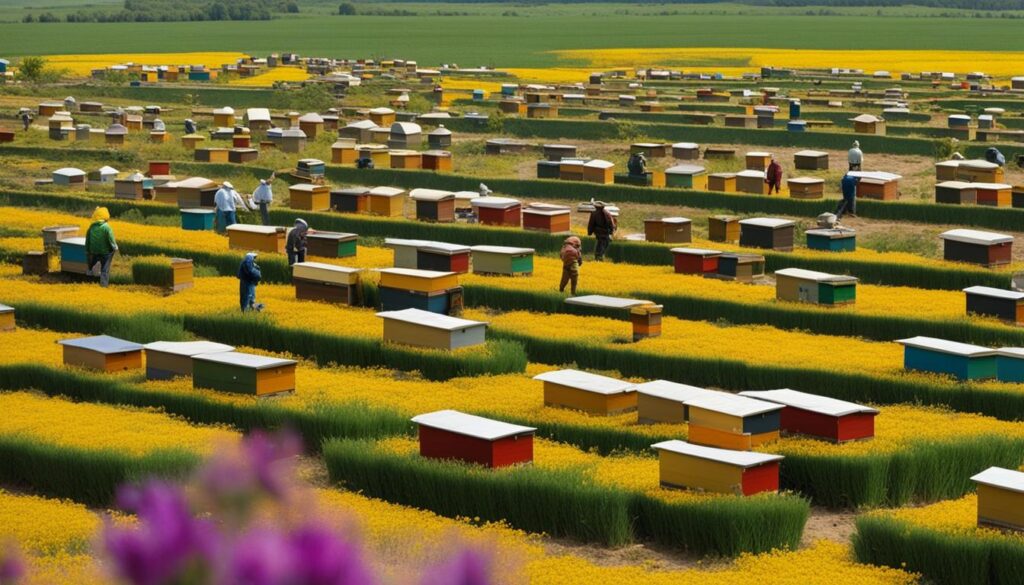
Volunteering with Beekeeping Organizations
Volunteering with beekeeping organizations is an excellent way to share your enthusiasm and skills while making a positive contribution to bee conservation. By joining forces with these organizations, you can actively participate in initiatives aimed at protecting and preserving bee populations.
Whether you have prior experience or are new to beekeeping, there are various volunteering opportunities available. You can choose to assist with setting up educational displays, running stalls at events, or even become a local volunteer coordinator. By dedicating your time and energy to these activities, you can play an integral role in educating others about the importance of bees and their impact on the environment.
Volunteer Roles with Beekeeping Organizations
When volunteering with beekeeping organizations, you can contribute to different aspects of their mission. Here are some common volunteer roles:
- Event Support: Help organize and run events such as workshops, seminars, and fundraisers.
- Education and Outreach: Assist in developing educational materials, delivering presentations, and engaging with the community to raise awareness about bees and their conservation.
- Beekeeping Assistance: Aid beekeepers in managing hives, harvesting honey, and maintaining beekeeping equipment.
- Research and Data Collection: Contribute to data collection efforts, monitoring bee populations, and conducting field research.
By volunteering in these roles, you not only support the organizations’ efforts but also gain valuable knowledge and hands-on experience in beekeeping practices. It’s a rewarding way to make a difference and foster a deeper connection with nature.
| Benefits of Volunteering with Beekeeping Organizations | Opportunities to: |
|---|---|
| Contribute to bee conservation | Protect and preserve bee populations |
| Learn and gain hands-on experience | Expand your knowledge of beekeeping practices |
| Connect with like-minded individuals | Build a network within the beekeeping community |
| Make a positive impact | Inspire change and educate others about the importance of bees |
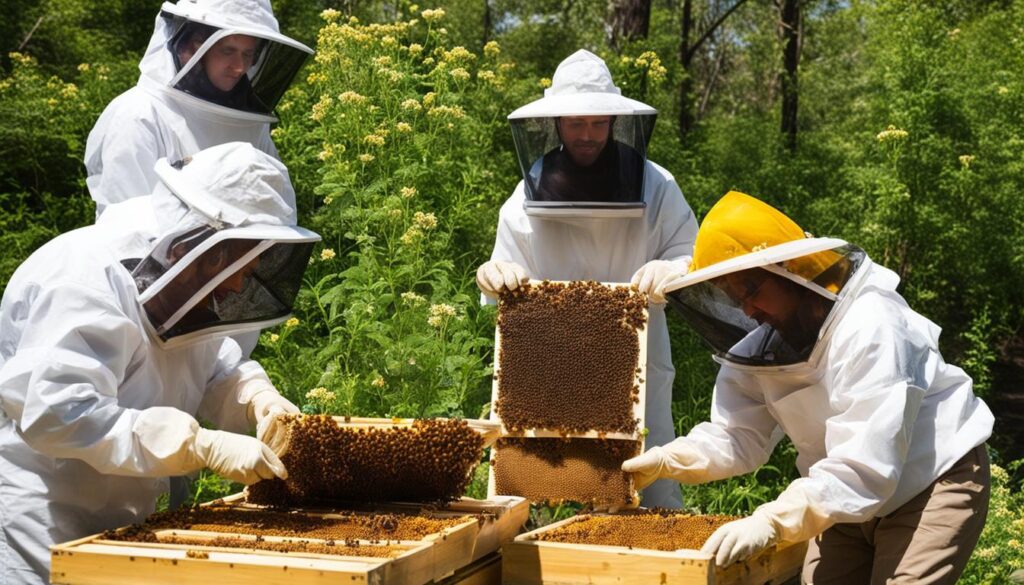
“Volunteering with beekeeping organizations is not only a chance to support bee conservation but also an opportunity to learn from experienced beekeepers and connect with a community passionate about making a difference. By actively participating in initiatives and events, you can actively contribute to the preservation of these vital pollinators and create a positive impact on the environment.”
BeeWalk – Contributing to Bumblebee Recording
The Bumblebee Conservation Trust runs a national bumblebee recording scheme called BeeWalk, which aims to monitor bumblebee populations across the UK. Participating in BeeWalk surveys is an excellent way to contribute to bumblebee conservation and help protect these important pollinators. By collecting data on bumblebee sightings and species distribution, volunteers play a crucial role in understanding the health and trends of bumblebee populations. Your involvement can make a real difference in creating a sustainable environment for these charismatic insects.
Getting involved in BeeWalk is easy and rewarding. To participate, you can sign up as a BeeWalker on the Bumblebee Conservation Trust’s website. Once registered, you will receive guidance on how to conduct surveys and record bumblebee sightings. The surveys involve walking a set route once a month between March and October, observing and recording bumblebees along the way. This regular monitoring provides valuable data that helps researchers and conservationists identify species declines, changes in distribution, and potential threats.
Why BeeWalk Matters
BeeWalk surveys provide important insights into the status of bumblebees and their habitats. The data collected by volunteers contributes to scientific research, informs conservation efforts, and helps assess the success of initiatives aimed at protecting bumblebees. By participating in BeeWalk, you become part of a nationwide endeavor to safeguard bumblebee populations and ensure their survival for future generations.
Joining BeeWalk allows you to contribute directly to bumblebee conservation while deepening your understanding of these remarkable creatures. By recording sightings and observing their behavior, you can gain firsthand knowledge of different bumblebee species and their ecological roles. Participating in BeeWalk is an opportunity to connect with nature, learn about the challenges facing bumblebees, and actively contribute to their preservation.
Conclusion
By embracing beekeeping volunteer opportunities, you have the power to make a difference and create a positive impact on the environment. Through various avenues such as online resources, local mentors, associations and clubs, educational initiatives, creating bee-friendly spaces, and volunteering with beekeeping organizations, you can contribute to the preservation of bee populations and learn about the fascinating world of bees.
Not only will you gain hands-on experience and knowledge, but you will also foster a deeper connection with nature. Whether you are passionate about bee conservation or interested in beekeeping as a hobby, joining the beekeeping community allows you to contribute to a cause and inspire change in your own unique way.
So why wait? Start exploring the different options available to you and begin your journey in beekeeping today. Together, we can create a brighter future for bees and our environment.
FAQ
Are beekeeping volunteer opportunities only for people who have their own beehives?
No, there are various ways to get involved in the beekeeping community without having your own beehive. You can join beekeeping associations, connect with local beekeeping mentors, educate others about bees, create bee-friendly gardens, explore bee farms, and volunteer with beekeeping organizations.
How can I learn more about beekeeping?
Beekeeping websites and blogs, such as PerfectBee and Adventures in Beeland, provide valuable information and insights from experienced beekeepers. Connecting with a local beekeeping mentor can also be beneficial for hands-on learning.
How can I find a local beekeeping mentor?
You can easily find local beekeeping mentors by searching online or contacting beekeeping associations or clubs in your area.
What are the benefits of joining a beekeeping association or club?
By becoming a member of a beekeeping association or club, you gain access to valuable equipment and supplies and have the opportunity to attend meetings, workshops, and events where you can expand your knowledge and network with other beekeepers.
How can I support bee conservation efforts without having my own beehive?
You can make a positive impact by educating others about bees, supporting organizations like The Honeybee Conservancy, hosting local screenings of documentaries like “Vanishing of the Bees,” and creating a bee-friendly environment in your backyard.
How can I create a bee-friendly garden?
Planting a variety of nectar-rich flowers that bloom in different seasons and building a bee bath with fresh water can provide sustenance and hydration for bees. You can find tips and ideas for building a bee-friendly garden on PerfectBee’s Pinterest page.
Where can I learn more about bees and their conservation?
You can deepen your knowledge and appreciation for bees by visiting bee farms, sanctuaries, community bee gardens, or wildlife reserves in your area. Many of these places offer honey tastings, educational activities, and free bee tours.
How can I volunteer with beekeeping organizations?
Volunteering with beekeeping organizations allows you to share your enthusiasm and skills, and you can take on various roles such as setting up displays, running stalls at events, or becoming a local volunteer coordinator. Get in touch with organizations like the Bumblebee Conservation Trust to find out more about volunteering opportunities.
How can I contribute to bumblebee recording?
You can assist in bumblebee recording by participating in BeeWalk surveys, which aim to monitor bumblebee populations across the UK. Visit the Bumblebee Conservation Trust’s website to learn more about how you can get involved and help contribute to bumblebee conservation.
How can I make a difference through beekeeping volunteer opportunities?
By joining beekeeping volunteer opportunities, you can contribute to preserving our environment and bee populations while gaining hands-on experience and knowledge. You can make a positive impact on the environment, educate others about bees, and foster a deeper connection with nature.

